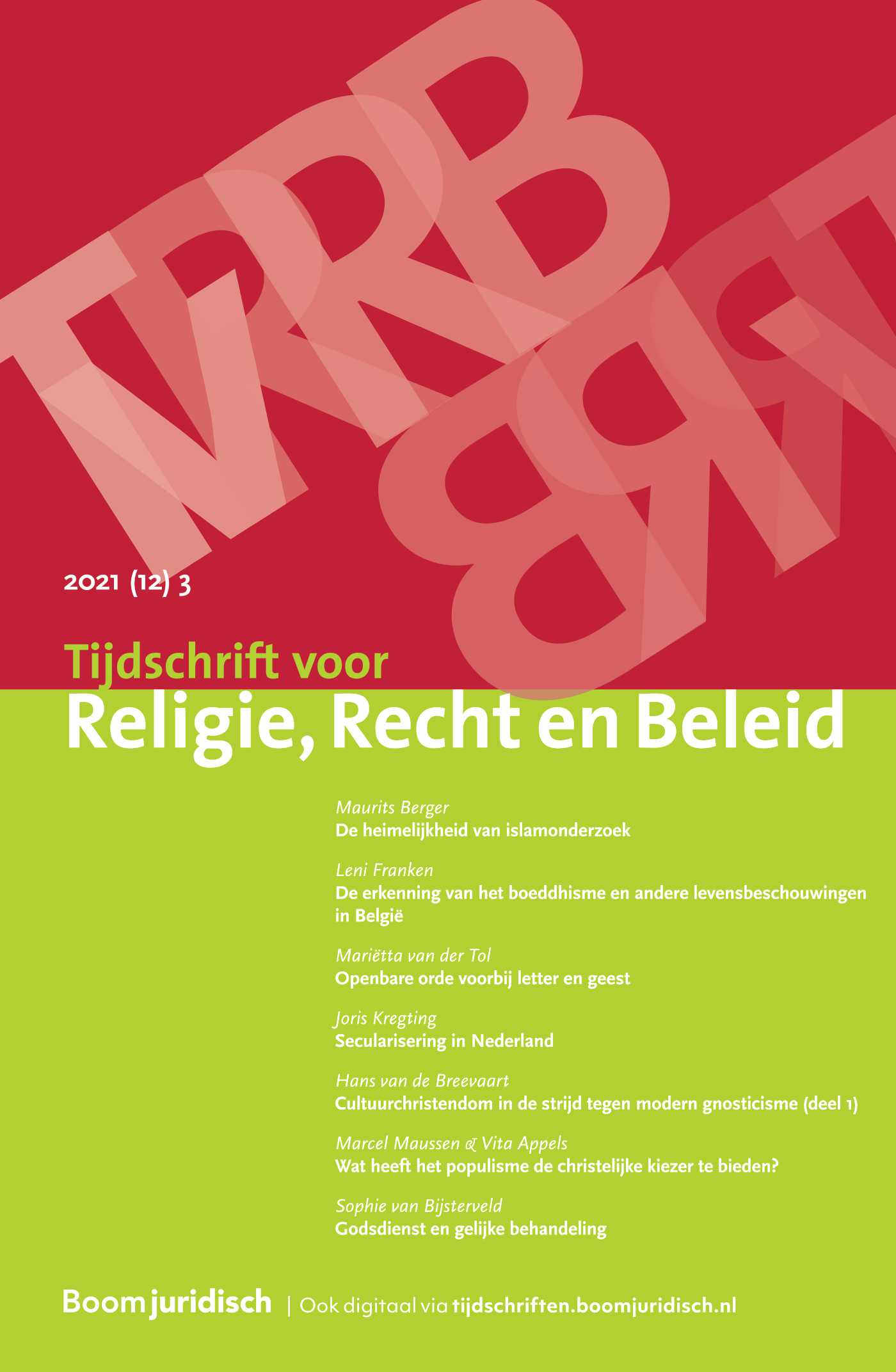|
The Dutch policy of the ‘Participation Society’ intends to return many societal responsibilities to civil society. As religious organizations traditionally had undertaken that task, an increase in their participation is expected. However, the separation of state and religion often proves an obstacle. Also, there is quite some scepticism among religious organization regarding the role that a state should have in its caring duties. This contribution contains several insightful and critical articles on this subject: the introduction is by Gert-Jan Buitendijk, director-general with the Ministry of Interior, who is involved in the policy-making process of the Participation Society policy, followed by brief reflections by two scholars of religion and theology, and two representatives of the Islamic and Catholic communities. These contributions were the outcome of a lustrum symposium organized by the Journal for Religion, Law and Policy in november 2015, where academics, policy makers and representatives of religious organizations discussed the effects of the ‘Participation Society’ policies and laws in the Netherlands. |


Tijdschrift voor Religie, Recht en Beleid
Meer op het gebied van Algemeen
Over dit tijdschriftMeld u zich hier aan voor de attendering op dit tijdschrift zodat u direct een mail ontvangt als er een nieuw digitaal nummer is verschenen en u de artikelen online kunt lezen.
| Redactioneel |
Hulp gevraagd maar handen af |
| Auteurs | Maurits Berger |
| Artikel |
Religieuze instellingen en de participatiesamenleving |
| Trefwoorden | scheiding van kerk en staat, Participatiemaatschappij, religie, Verzorgingsstaat |
| Auteurs | Drs. Gert-Jan Buitendijk, Prof. dr. Christoph Hübenthal, Prof. dr. Frans Wijsen e.a. |
| SamenvattingAuteursinformatie |
| Artikel |
|
| Trefwoorden | kinderhuwelijken, informele huwelijken, religieuze huwelijken, gedwongen huwelijken |
| Auteurs | Prof. dr. Susan Rutten |
| SamenvattingAuteursinformatie |
|
Current developments and recent research findings reveal that the Netherlands have to cope with the existence of child marriages. In this article it will be examined whether the modifications that were introduced by the Dutch marriage law that entered into force at the end of 2015, can be expected to contribute to the improvement of issues on child marriages. |
| Artikel |
|
| Trefwoorden | democratische rechtsstaat, kerk/religie, godsdienstvrijheid,, publiek domein, Verlichting |
| Auteurs | Prof. dr. Leo Koffeman |
| SamenvattingAuteursinformatie |
|
This article presents a summary of a report of the (mainline) Protestant Church in the Netherlands on democracy and the rule of law (see: www.protestantsekerk.nl/Lists/PKN-Bibliotheek/The-church-and-the-democratic-constitutional-state.pdf), including an evaluation. It starts from the presumption that modern plural society rightly expects religious communities to present their views in this regard explicitly and clearly. The report presents an interpretation of what ‘the separation of church and state’ entails, as well as an analysis of recent developments in the public domain. The church expresses its critical solidarity with the modern state. It points to the risk of democracy turning into a market rather than a forum. |
| Artikel |
Paus Benedictus XVI: onvermoed rechtsfilosoof? |
| Trefwoorden | Rechtsfilosofie, paus Benedictus XVI, achtergrondcultuur, Rechtspositivisme |
| Auteurs | Mr. dr. Richard Steenvoorde |
| SamenvattingAuteursinformatie |
|
During his pontificate pope Benedict XVI held five important speeches on democracy and law. In a new study, edited by Marta Cartabia and Andrea Simonici, it is argued that these speeches constitute a papal legal philosophy on the foundation of law. This book review explores that claim. Did emeritus pope Benedict XVI have a distinctive legal philosophy? May be, but the material covered in the book might not be enough to fully support the status of pope Benedict XVI as a legal philosopher. What is needed is a more integral study that includes other papal statements on the principles of law (for instance to the Roman Rota) on the one hand, and the work of the theologian Joseph cardinal Ratzinger before he became pope Benedict XVI on the other hand. |
| Artikel |
Conservatisme onder Nederlandse evangelische christenen: een hedendaagse ‘religion gap’? |
| Trefwoorden | economisch conservatisme, cultureel conservatisme, orthodoxe christenen, pro life issues |
| Auteurs | Dr. Paul Vermeer, Prof. dr. Peer Scheepers en Drs. Joris Kregting |
| SamenvattingAuteursinformatie |
|
Following the earlier work of the Dutch political scientist Middendorp on conservative views among the Dutch population, this study tries to find out if there is still a relationship between conservatism and religion. Earlier research revealed that also church members became less conservative over time and that the gap between church members and non-church members is closing in this respect. Only orthodox Christians continued to hold more conservative views over time. A distinction which still exists today as the results of this study among evangelical Christians show. This group of orthodox Christians distinguishes itself from both mainline Christians and the secular Dutch not so much by having a conservative outlook on economic matters, but by upholding conservative views in pro life issues. |

